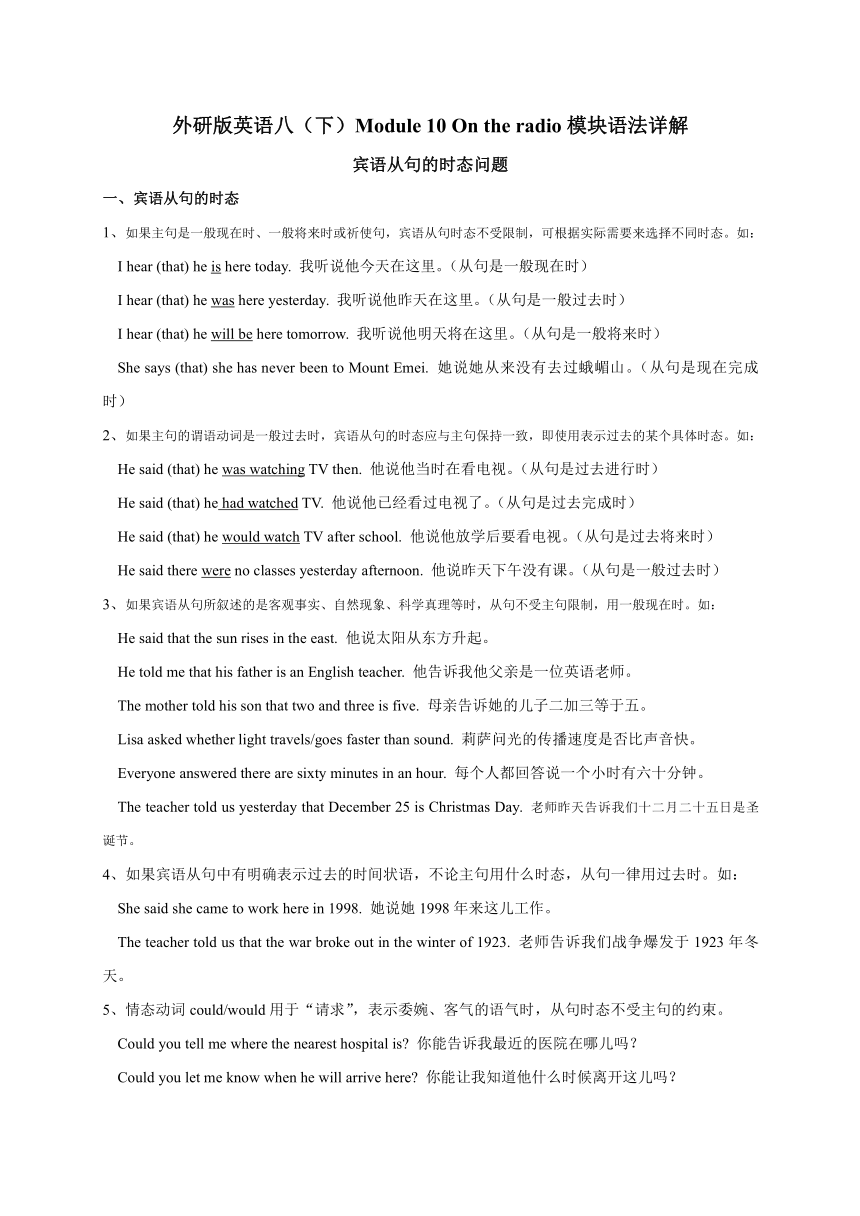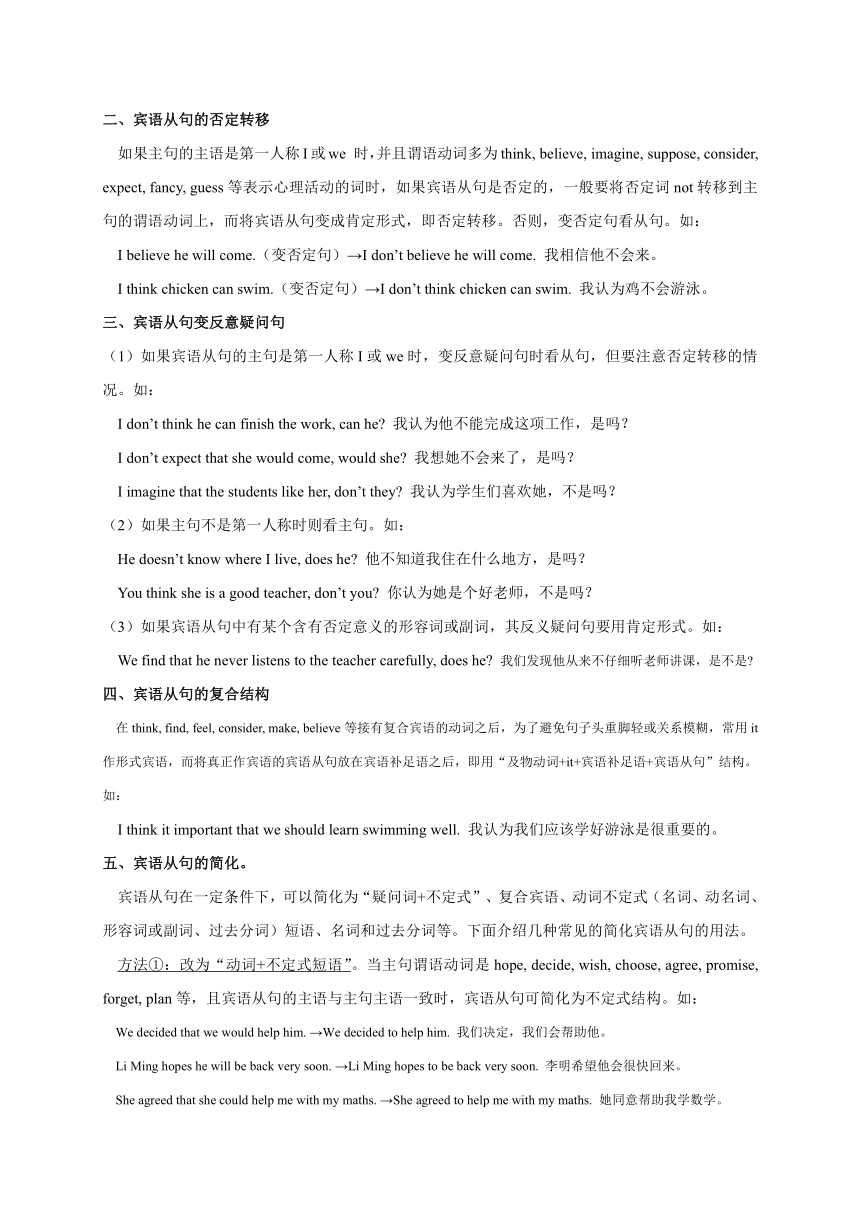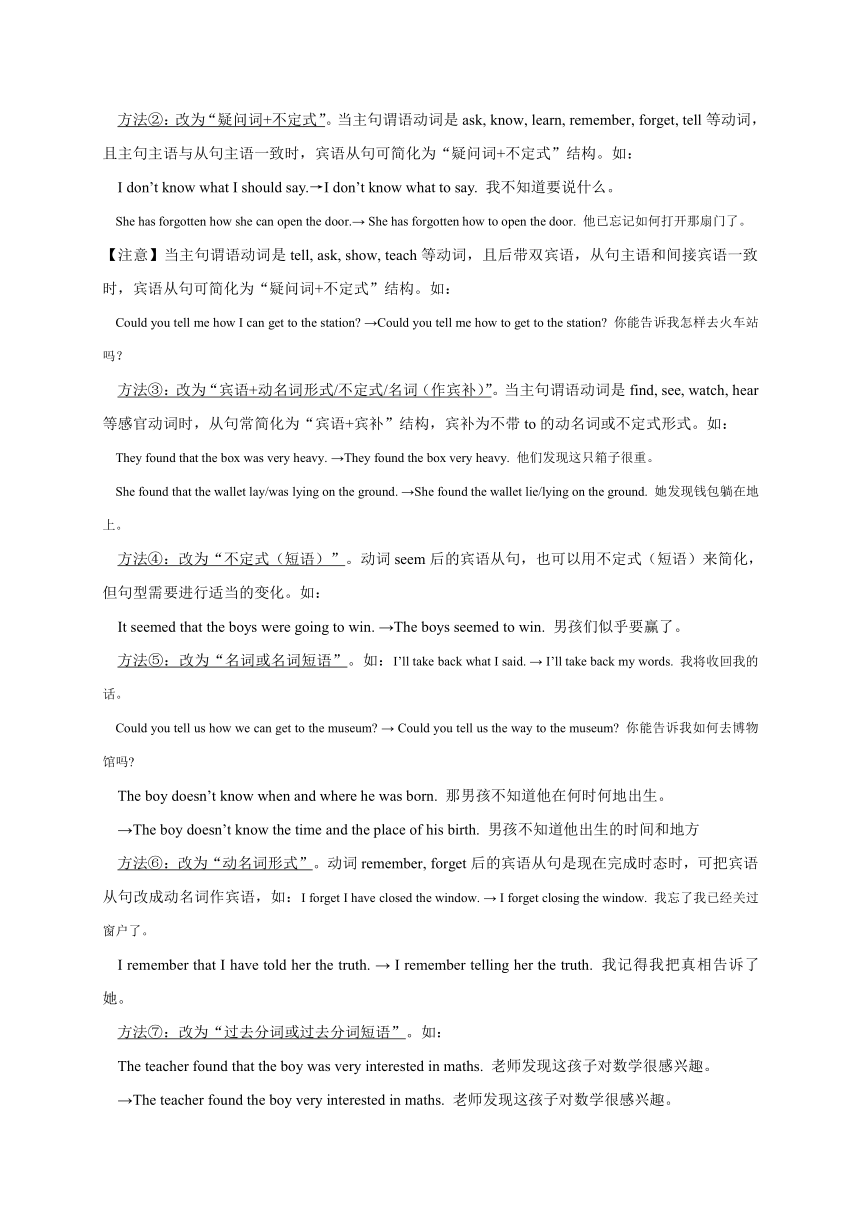8下Module 10 On the radio 语法讲练(含答案)
文档属性
| 名称 | 8下Module 10 On the radio 语法讲练(含答案) |  | |
| 格式 | zip | ||
| 文件大小 | 42.0KB | ||
| 资源类型 | 教案 | ||
| 版本资源 | 外研版 | ||
| 科目 | 英语 | ||
| 更新时间 | 2023-01-16 11:52:49 | ||
图片预览



文档简介
外研版英语八(下)Module 10 On the radio模块语法详解
宾语从句的时态问题
一、宾语从句的时态
1、如果主句是一般现在时、一般将来时或祈使句,宾语从句时态不受限制,可根据实际需要来选择不同时态。如:
I hear (that) he is here today. 我听说他今天在这里。(从句是一般现在时)
I hear (that) he was here yesterday. 我听说他昨天在这里。(从句是一般过去时)
I hear (that) he will be here tomorrow. 我听说他明天将在这里。(从句是一般将来时)
She says (that) she has never been to Mount Emei. 她说她从来没有去过蛾嵋山。(从句是现在完成时)
2、如果主句的谓语动词是一般过去时,宾语从句的时态应与主句保持一致,即使用表示过去的某个具体时态。如:
He said (that) he was watching TV then. 他说他当时在看电视。(从句是过去进行时)
He said (that) he had watched TV. 他说他已经看过电视了。(从句是过去完成时)
He said (that) he would watch TV after school. 他说他放学后要看电视。(从句是过去将来时)
He said there were no classes yesterday afternoon. 他说昨天下午没有课。(从句是一般过去时)
3、如果宾语从句所叙述的是客观事实、自然现象、科学真理等时,从句不受主句限制,用一般现在时。如:
He said that the sun rises in the east. 他说太阳从东方升起。
He told me that his father is an English teacher. 他告诉我他父亲是一位英语老师。
The mother told his son that two and three is five. 母亲告诉她的儿子二加三等于五。
Lisa asked whether light travels/goes faster than sound. 莉萨问光的传播速度是否比声音快。
Everyone answered there are sixty minutes in an hour. 每个人都回答说一个小时有六十分钟。
The teacher told us yesterday that December 25 is Christmas Day. 老师昨天告诉我们十二月二十五日是圣诞节。
4、如果宾语从句中有明确表示过去的时间状语,不论主句用什么时态,从句一律用过去时。如:
She said she came to work here in 1998. 她说她1998年来这儿工作。
The teacher told us that the war broke out in the winter of 1923. 老师告诉我们战争爆发于1923年冬天。
5、情态动词could/would用于“请求”,表示委婉、客气的语气时,从句时态不受主句的约束。
Could you tell me where the nearest hospital is 你能告诉我最近的医院在哪儿吗?
Could you let me know when he will arrive here 你能让我知道他什么时候离开这儿吗?
二、宾语从句的否定转移
如果主句的主语是第一人称I或we 时,并且谓语动词多为think, believe, imagine, suppose, consider, expect, fancy, guess等表示心理活动的词时,如果宾语从句是否定的,一般要将否定词not转移到主句的谓语动词上,而将宾语从句变成肯定形式,即否定转移。否则,变否定句看从句。如:
I believe he will come.(变否定句)→I don’t believe he will come. 我相信他不会来。
I think chicken can swim.(变否定句)→I don’t think chicken can swim. 我认为鸡不会游泳。
三、宾语从句变反意疑问句
(1)如果宾语从句的主句是第一人称I或we时,变反意疑问句时看从句,但要注意否定转移的情况。如:
I don’t think he can finish the work, can he 我认为他不能完成这项工作,是吗?
I don’t expect that she would come, would she 我想她不会来了,是吗?
I imagine that the students like her, don’t they 我认为学生们喜欢她,不是吗?
(2)如果主句不是第一人称时则看主句。如:
He doesn’t know where I live, does he 他不知道我住在什么地方,是吗?
You think she is a good teacher, don’t you 你认为她是个好老师,不是吗?
(3)如果宾语从句中有某个含有否定意义的形容词或副词,其反义疑问句要用肯定形式。如:
We find that he never listens to the teacher carefully, does he 我们发现他从来不仔细听老师讲课,是不是
四、宾语从句的复合结构
在think, find, feel, consider, make, believe等接有复合宾语的动词之后,为了避免句子头重脚轻或关系模糊,常用it作形式宾语,而将真正作宾语的宾语从句放在宾语补足语之后,即用“及物动词+it+宾语补足语+宾语从句”结构。如:
I think it important that we should learn swimming well. 我认为我们应该学好游泳是很重要的。
五、宾语从句的简化。
宾语从句在一定条件下,可以简化为“疑问词+不定式”、复合宾语、动词不定式(名词、动名词、形容词或副词、过去分词)短语、名词和过去分词等。下面介绍几种常见的简化宾语从句的用法。
方法①:改为“动词+不定式短语”。当主句谓语动词是hope, decide, wish, choose, agree, promise, forget, plan等,且宾语从句的主语与主句主语一致时,宾语从句可简化为不定式结构。如:
We decided that we would help him. →We decided to help him. 我们决定,我们会帮助他。
Li Ming hopes he will be back very soon. →Li Ming hopes to be back very soon. 李明希望他会很快回来。
She agreed that she could help me with my maths. →She agreed to help me with my maths. 她同意帮助我学数学。
方法②:改为“疑问词+不定式”。当主句谓语动词是ask, know, learn, remember, forget, tell等动词,且主句主语与从句主语一致时,宾语从句可简化为“疑问词+不定式”结构。如:
I don’t know what I should say.→I don’t know what to say. 我不知道要说什么。
She has forgotten how she can open the door.→ She has forgotten how to open the door. 他已忘记如何打开那扇门了。
【注意】当主句谓语动词是tell, ask, show, teach等动词,且后带双宾语,从句主语和间接宾语一致时,宾语从句可简化为“疑问词+不定式”结构。如:
Could you tell me how I can get to the station →Could you tell me how to get to the station 你能告诉我怎样去火车站吗?
方法③:改为“宾语+动名词形式/不定式/名词(作宾补)”。当主句谓语动词是find, see, watch, hear等感官动词时,从句常简化为“宾语+宾补”结构,宾补为不带to的动名词或不定式形式。如:
They found that the box was very heavy. →They found the box very heavy. 他们发现这只箱子很重。
She found that the wallet lay/was lying on the ground. →She found the wallet lie/lying on the ground. 她发现钱包躺在地上。
方法④:改为“不定式(短语)”。动词seem后的宾语从句,也可以用不定式(短语)来简化,但句型需要进行适当的变化。如:
It seemed that the boys were going to win. →The boys seemed to win. 男孩们似乎要赢了。
方法⑤:改为“名词或名词短语”。如:I’ll take back what I said. → I’ll take back my words. 我将收回我的话。
Could you tell us how we can get to the museum → Could you tell us the way to the museum 你能告诉我如何去博物馆吗
The boy doesn’t know when and where he was born. 那男孩不知道他在何时何地出生。
→The boy doesn’t know the time and the place of his birth. 男孩不知道他出生的时间和地方
方法⑥:改为“动名词形式”。动词remember, forget后的宾语从句是现在完成时态时,可把宾语从句改成动名词作宾语,如:I forget I have closed the window. → I forget closing the window. 我忘了我已经关过窗户了。
I remember that I have told her the truth. → I remember telling her the truth. 我记得我把真相告诉了她。
方法⑦:改为“过去分词或过去分词短语”。如:
The teacher found that the boy was very interested in maths. 老师发现这孩子对数学很感兴趣。
→The teacher found the boy very interested in maths. 老师发现这孩子对数学很感兴趣。
Soon they found that the ground was covered with thick snow. 他们很快发现地面被厚雪覆盖了。
→Soon they found the ground covered with thick snow. 他们很快发现地面被厚雪覆盖了。
六、宾语从句和状语从句的区别
if和when既可以引导宾语从句,也可以引导状语从句,应注意它们在两种从句中的意思和用法的不同。if和when引导宾语从句时,分别意为“是否”和“何时”,其时态应和主句时态相呼应;它们引导状语从句时,意思分别为“如果,假如”和“当……时候”,当主句时态是一般将来时时,从句时态用一般现在时。它们常常放在含有状语从句和宾语从句的题干中进行综合考查。如:
---- I don’t know if he will come. 我不知道他是否会来。
---- He will come if it doesn’t rain. 如果不下雨,他会来的。
---- Do you know when he will come back tomorrow 你知道他明天什么时候回来吗?
---- Sorry, I don’t know. When he comes back, I’ll tell you. 对不起,不知道。当他回来了,我将告诉你。
模块语法即学即练
一、单项选择
( ) 1. Do you know last year
A. what I said B. what I’m saying C. what I says
( ) 2. Linda said the moon round the earth.
A. travelled B. has travelled C. travels D. had travelled
( ) 3. She asked me .
A. who he was B. who was he C. who is he D. who he is
( ) 4. Could you tell me where
A. the tape was B. was the tape C. the tape is D. is the tape
( ) 5. The doctor asked me how long .
A. was I ill B. have I been ill C. I have been ill D. I had been ill
( ) 6. ---- Helen, do you know if Martin to my party next week ---- I think he will come if he free.
A. will come; will be B. will come; is C. come; is D. comes; will be
( ) 7.---- I don’t know if his uncle _______. ---- I think he _______ if it doesn’t rain.
A. will come; comes B. will come; will come C. comes; comes D. comes; will come
( ) 8. Will you please tell me with Peter He looks unhappy.
A. what’s wrong B. what wrong is C. the wrong is what D. what wrong it is
( ) 9. My teacher told me .
A. the sun rises in the east B. that the sun rised in the east C. the sun raise in the east D. the sun risen in the east
( ) 10. I wanted to know those days because she was so hard-working.
A. if will she be successful B. if she would be successful C. if she will be successful D. that she would be successful
( ) 11. ---- Your book is very interesting. Could you tell me ---- In Xinhua Bookstore next to our school.
A.where did you buy it B.why did you buy it C.where you bought it D.why you bought it
二、按要求完成句子。
1. “Do the girls need any help ”he asked me. (变为含宾语从句的复合句)
He asked me __________ the girls __________ some help.
2. Light travels faster than sound. My teacher told me. (变为含宾语从句的复合句)
My teacher told me __________ light __________ faster than sound.
3. When does the train leave I want to know. (变为含宾语从句的复合句)
I want to know __________ the train __________ .
4. Did Peter come here yesterday Li Lei wants to know. (变为含宾语从句的复合句)
Li Lei wants to know __________ Peter __________ here yesterday.
5. He couldn’t work out the problem. I believed. (变为含宾语从句的复合句)
I __________ __________ __________ __________ work out the problem.
6. Light travels faster than sound. Almost all the people know. (变为含宾语从句的复合句)
Almost all the people know _________ ________ _______ faster than sound.
7. Jodie often helps her classmates with their study. All of us know. (变为含宾语从句的复合句)
All of us knew ________ Jodie often ________ her classmates with their study.
8. Robert asked his new classmate, “Do you come from Australia ” (变为含宾语从句的复合句)
Robert asked his new classmate __________ __________ __________ __________ Australia.
9. I believe there will be a bus. (变为否定句)
I __________ ______ there __________ ______ a bus.
10. He told me that he had been to the Singapore twice. (对画线部分提问)
__________ ______ he tell you
新外研版英语八(下)Module 10 On the radio
模块语法即学即练
一、单项选择。1—5 ACACD 6—10 BCBAD
二、按要求完成句子。
1. if/whether; needed 2. that; travels 3. when; leaves 4. if/whether; came 5. didn’t believe he could
6. that light travels 7. that; helped 8. if/whether he came/was from 9. don’t believe; will be 10. What did
宾语从句的时态问题
一、宾语从句的时态
1、如果主句是一般现在时、一般将来时或祈使句,宾语从句时态不受限制,可根据实际需要来选择不同时态。如:
I hear (that) he is here today. 我听说他今天在这里。(从句是一般现在时)
I hear (that) he was here yesterday. 我听说他昨天在这里。(从句是一般过去时)
I hear (that) he will be here tomorrow. 我听说他明天将在这里。(从句是一般将来时)
She says (that) she has never been to Mount Emei. 她说她从来没有去过蛾嵋山。(从句是现在完成时)
2、如果主句的谓语动词是一般过去时,宾语从句的时态应与主句保持一致,即使用表示过去的某个具体时态。如:
He said (that) he was watching TV then. 他说他当时在看电视。(从句是过去进行时)
He said (that) he had watched TV. 他说他已经看过电视了。(从句是过去完成时)
He said (that) he would watch TV after school. 他说他放学后要看电视。(从句是过去将来时)
He said there were no classes yesterday afternoon. 他说昨天下午没有课。(从句是一般过去时)
3、如果宾语从句所叙述的是客观事实、自然现象、科学真理等时,从句不受主句限制,用一般现在时。如:
He said that the sun rises in the east. 他说太阳从东方升起。
He told me that his father is an English teacher. 他告诉我他父亲是一位英语老师。
The mother told his son that two and three is five. 母亲告诉她的儿子二加三等于五。
Lisa asked whether light travels/goes faster than sound. 莉萨问光的传播速度是否比声音快。
Everyone answered there are sixty minutes in an hour. 每个人都回答说一个小时有六十分钟。
The teacher told us yesterday that December 25 is Christmas Day. 老师昨天告诉我们十二月二十五日是圣诞节。
4、如果宾语从句中有明确表示过去的时间状语,不论主句用什么时态,从句一律用过去时。如:
She said she came to work here in 1998. 她说她1998年来这儿工作。
The teacher told us that the war broke out in the winter of 1923. 老师告诉我们战争爆发于1923年冬天。
5、情态动词could/would用于“请求”,表示委婉、客气的语气时,从句时态不受主句的约束。
Could you tell me where the nearest hospital is 你能告诉我最近的医院在哪儿吗?
Could you let me know when he will arrive here 你能让我知道他什么时候离开这儿吗?
二、宾语从句的否定转移
如果主句的主语是第一人称I或we 时,并且谓语动词多为think, believe, imagine, suppose, consider, expect, fancy, guess等表示心理活动的词时,如果宾语从句是否定的,一般要将否定词not转移到主句的谓语动词上,而将宾语从句变成肯定形式,即否定转移。否则,变否定句看从句。如:
I believe he will come.(变否定句)→I don’t believe he will come. 我相信他不会来。
I think chicken can swim.(变否定句)→I don’t think chicken can swim. 我认为鸡不会游泳。
三、宾语从句变反意疑问句
(1)如果宾语从句的主句是第一人称I或we时,变反意疑问句时看从句,但要注意否定转移的情况。如:
I don’t think he can finish the work, can he 我认为他不能完成这项工作,是吗?
I don’t expect that she would come, would she 我想她不会来了,是吗?
I imagine that the students like her, don’t they 我认为学生们喜欢她,不是吗?
(2)如果主句不是第一人称时则看主句。如:
He doesn’t know where I live, does he 他不知道我住在什么地方,是吗?
You think she is a good teacher, don’t you 你认为她是个好老师,不是吗?
(3)如果宾语从句中有某个含有否定意义的形容词或副词,其反义疑问句要用肯定形式。如:
We find that he never listens to the teacher carefully, does he 我们发现他从来不仔细听老师讲课,是不是
四、宾语从句的复合结构
在think, find, feel, consider, make, believe等接有复合宾语的动词之后,为了避免句子头重脚轻或关系模糊,常用it作形式宾语,而将真正作宾语的宾语从句放在宾语补足语之后,即用“及物动词+it+宾语补足语+宾语从句”结构。如:
I think it important that we should learn swimming well. 我认为我们应该学好游泳是很重要的。
五、宾语从句的简化。
宾语从句在一定条件下,可以简化为“疑问词+不定式”、复合宾语、动词不定式(名词、动名词、形容词或副词、过去分词)短语、名词和过去分词等。下面介绍几种常见的简化宾语从句的用法。
方法①:改为“动词+不定式短语”。当主句谓语动词是hope, decide, wish, choose, agree, promise, forget, plan等,且宾语从句的主语与主句主语一致时,宾语从句可简化为不定式结构。如:
We decided that we would help him. →We decided to help him. 我们决定,我们会帮助他。
Li Ming hopes he will be back very soon. →Li Ming hopes to be back very soon. 李明希望他会很快回来。
She agreed that she could help me with my maths. →She agreed to help me with my maths. 她同意帮助我学数学。
方法②:改为“疑问词+不定式”。当主句谓语动词是ask, know, learn, remember, forget, tell等动词,且主句主语与从句主语一致时,宾语从句可简化为“疑问词+不定式”结构。如:
I don’t know what I should say.→I don’t know what to say. 我不知道要说什么。
She has forgotten how she can open the door.→ She has forgotten how to open the door. 他已忘记如何打开那扇门了。
【注意】当主句谓语动词是tell, ask, show, teach等动词,且后带双宾语,从句主语和间接宾语一致时,宾语从句可简化为“疑问词+不定式”结构。如:
Could you tell me how I can get to the station →Could you tell me how to get to the station 你能告诉我怎样去火车站吗?
方法③:改为“宾语+动名词形式/不定式/名词(作宾补)”。当主句谓语动词是find, see, watch, hear等感官动词时,从句常简化为“宾语+宾补”结构,宾补为不带to的动名词或不定式形式。如:
They found that the box was very heavy. →They found the box very heavy. 他们发现这只箱子很重。
She found that the wallet lay/was lying on the ground. →She found the wallet lie/lying on the ground. 她发现钱包躺在地上。
方法④:改为“不定式(短语)”。动词seem后的宾语从句,也可以用不定式(短语)来简化,但句型需要进行适当的变化。如:
It seemed that the boys were going to win. →The boys seemed to win. 男孩们似乎要赢了。
方法⑤:改为“名词或名词短语”。如:I’ll take back what I said. → I’ll take back my words. 我将收回我的话。
Could you tell us how we can get to the museum → Could you tell us the way to the museum 你能告诉我如何去博物馆吗
The boy doesn’t know when and where he was born. 那男孩不知道他在何时何地出生。
→The boy doesn’t know the time and the place of his birth. 男孩不知道他出生的时间和地方
方法⑥:改为“动名词形式”。动词remember, forget后的宾语从句是现在完成时态时,可把宾语从句改成动名词作宾语,如:I forget I have closed the window. → I forget closing the window. 我忘了我已经关过窗户了。
I remember that I have told her the truth. → I remember telling her the truth. 我记得我把真相告诉了她。
方法⑦:改为“过去分词或过去分词短语”。如:
The teacher found that the boy was very interested in maths. 老师发现这孩子对数学很感兴趣。
→The teacher found the boy very interested in maths. 老师发现这孩子对数学很感兴趣。
Soon they found that the ground was covered with thick snow. 他们很快发现地面被厚雪覆盖了。
→Soon they found the ground covered with thick snow. 他们很快发现地面被厚雪覆盖了。
六、宾语从句和状语从句的区别
if和when既可以引导宾语从句,也可以引导状语从句,应注意它们在两种从句中的意思和用法的不同。if和when引导宾语从句时,分别意为“是否”和“何时”,其时态应和主句时态相呼应;它们引导状语从句时,意思分别为“如果,假如”和“当……时候”,当主句时态是一般将来时时,从句时态用一般现在时。它们常常放在含有状语从句和宾语从句的题干中进行综合考查。如:
---- I don’t know if he will come. 我不知道他是否会来。
---- He will come if it doesn’t rain. 如果不下雨,他会来的。
---- Do you know when he will come back tomorrow 你知道他明天什么时候回来吗?
---- Sorry, I don’t know. When he comes back, I’ll tell you. 对不起,不知道。当他回来了,我将告诉你。
模块语法即学即练
一、单项选择
( ) 1. Do you know last year
A. what I said B. what I’m saying C. what I says
( ) 2. Linda said the moon round the earth.
A. travelled B. has travelled C. travels D. had travelled
( ) 3. She asked me .
A. who he was B. who was he C. who is he D. who he is
( ) 4. Could you tell me where
A. the tape was B. was the tape C. the tape is D. is the tape
( ) 5. The doctor asked me how long .
A. was I ill B. have I been ill C. I have been ill D. I had been ill
( ) 6. ---- Helen, do you know if Martin to my party next week ---- I think he will come if he free.
A. will come; will be B. will come; is C. come; is D. comes; will be
( ) 7.---- I don’t know if his uncle _______. ---- I think he _______ if it doesn’t rain.
A. will come; comes B. will come; will come C. comes; comes D. comes; will come
( ) 8. Will you please tell me with Peter He looks unhappy.
A. what’s wrong B. what wrong is C. the wrong is what D. what wrong it is
( ) 9. My teacher told me .
A. the sun rises in the east B. that the sun rised in the east C. the sun raise in the east D. the sun risen in the east
( ) 10. I wanted to know those days because she was so hard-working.
A. if will she be successful B. if she would be successful C. if she will be successful D. that she would be successful
( ) 11. ---- Your book is very interesting. Could you tell me ---- In Xinhua Bookstore next to our school.
A.where did you buy it B.why did you buy it C.where you bought it D.why you bought it
二、按要求完成句子。
1. “Do the girls need any help ”he asked me. (变为含宾语从句的复合句)
He asked me __________ the girls __________ some help.
2. Light travels faster than sound. My teacher told me. (变为含宾语从句的复合句)
My teacher told me __________ light __________ faster than sound.
3. When does the train leave I want to know. (变为含宾语从句的复合句)
I want to know __________ the train __________ .
4. Did Peter come here yesterday Li Lei wants to know. (变为含宾语从句的复合句)
Li Lei wants to know __________ Peter __________ here yesterday.
5. He couldn’t work out the problem. I believed. (变为含宾语从句的复合句)
I __________ __________ __________ __________ work out the problem.
6. Light travels faster than sound. Almost all the people know. (变为含宾语从句的复合句)
Almost all the people know _________ ________ _______ faster than sound.
7. Jodie often helps her classmates with their study. All of us know. (变为含宾语从句的复合句)
All of us knew ________ Jodie often ________ her classmates with their study.
8. Robert asked his new classmate, “Do you come from Australia ” (变为含宾语从句的复合句)
Robert asked his new classmate __________ __________ __________ __________ Australia.
9. I believe there will be a bus. (变为否定句)
I __________ ______ there __________ ______ a bus.
10. He told me that he had been to the Singapore twice. (对画线部分提问)
__________ ______ he tell you
新外研版英语八(下)Module 10 On the radio
模块语法即学即练
一、单项选择。1—5 ACACD 6—10 BCBAD
二、按要求完成句子。
1. if/whether; needed 2. that; travels 3. when; leaves 4. if/whether; came 5. didn’t believe he could
6. that light travels 7. that; helped 8. if/whether he came/was from 9. don’t believe; will be 10. What did
同课章节目录
- Module 1 Feelings and impressions
- Unit 1 It smells delicious.
- Unit 2 I feel nervous when I speak Chinese .
- Unit 3 Language in use
- Module 2 Experiences
- Unit 1 I've also entered lots of speaking competi
- Unit 2 They have seen the Pyramids.
- Unit 3 Language in use
- Module 3 Journey to space
- Unit 1 Has it arrived yet?
- Unit 2 We have not found life on any other planet
- Unit 3 Language in use
- Module 4 Seeing the docto
- Unit 1 I haven't done much exercise since I got m
- Unit 2 We have played football for a year now
- Unit 3 Language in use
- Module 5 Cartoons
- Unit 1 It's time to watch a cartoon.
- Unit 2 Tintin has been popular for over eighty yea
- Unit 3 Language in use
- Revision module A
- Module 6 Hobbies
- Unit 1 Do you collect anything ?
- Unit 2 Hobbies can make you grow as a person.
- Unit 3 Language in use
- Module 7 Summer in Los Angeles
- Unit 1 Please write to me and send me some photos
- Unit 2 Fill out a form and come to learn English
- Unit 3 Language in use
- Module 8 Time off
- Unit 1 I can hardly believe we are in the city ce
- Unit 2 We thought somebody was moving about
- Unit 3 Language in use
- Module 9 Friendship
- Unit 1 Could I ask if you've mentioned this to he
- Unit 2 I believe that the world is what you think
- Unit 3 Language in use
- Module 10 On the radio
- Unit 1 I hope that you can join us one day
- Unit 2 It seemed that they were speaking to me in
- Unit 3 Language in use
- Revision module B
